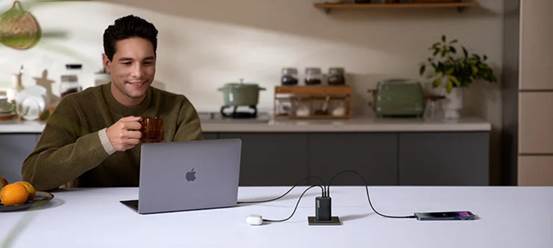Electric
devices are meant to make our lives easier, but when their chargers begin to
fail, they can quickly turn into a source of stress. A MacBook Pro charger that
no longer works properly is not just inconvenient—it can also become a real
safety hazard. Many people underestimate how much risk a damaged charger poses,
thinking it is simply a matter of slower charging or needing to wiggle the
cord. In reality, visible wear, overheating, or electrical irregularities could
damage your MacBook Pro or even put you at risk of fire or shock. In this
article, we will look at the most common signs of a failing charger and explain
how to choose a safe replacement when the time comes.

Physical Damage: Visible Signs of Wear and Tear
Inspect
your MacBook Pro charger regularly—frayed cables, bent connectors, or exposed
wires are clear signs it needs replacement. Some try to wrap damaged spots with
tape, but this only hides the danger: compromised casing raises the risk of
overheating, short-circuits, or sparks. Even small cracks near the plug can
weaken further with daily use. Since chargers endure bending, travel, and
accidents, wear over time is expected, and visible damage means it’s time for a
new one.
Performance Issues: When Charging Becomes Unreliable
Intermittent Charging or No Charging At All
A
failing charger often reveals itself not only through appearance but also
through inconsistent performance. If your MacBook Pro starts charging only when
the cable is positioned at a certain angle, that is usually a sign of internal
wire damage or a weakened connector. Many people notice their laptop randomly
stops charging during use, which can be disruptive if you are in the middle of
important work. Sometimes, the charger may seem to work fine one day and then
suddenly refuse to provide any power the next. This type of unreliability can
leave you stranded without a functioning laptop when you need it most. It also
indicates that the charger is under strain and may soon fail.

The Charger Gets Excessively Hot During Use
While
all chargers get warm during use, excessive heat is a serious warning sign. If
your MacBook Pro charger becomes uncomfortably hot quickly, it may be failing
to regulate power properly. This overheating reduces charging speed and strains
your laptop's battery. More critically, it can damage the charger’s internal
components, increasing the risk of failure or even a fire hazard. Many users
overlook this until they notice a burning smell or visible damage—by then, it’s
often too late. A well-functioning charger should remain only warm, not hot,
even after hours of use.
Safety Warnings: Signs You Should Never Ignore
Sparking, Burning Smell, or Electrical Shocks
Some
charger problems are so severe that they should never be ignored, no matter how
small they may seem at first. If you see sparks when plugging in your charger,
this is a sign of serious electrical instability. Likewise, a faint burning
smell or melted plastic around the cable or adapter is a red flag that
overheating and potential fire risks are already occurring. Even worse, if you
ever feel a mild electrical shock while handling the charger, it means
insulation has failed, and the charger is no longer safe to use. These problems
are not minor inconveniences but urgent warnings that the charger must be
replaced right away.
The Charger Makes Buzzing or Humming Noises
Another
warning sign that is often overlooked is unusual sounds coming from the
adapter. A charger should operate silently, so if you hear a buzzing, humming,
or faint crackling noise, it means the internal components are not working as
they should. This may happen due to aging circuits, loose connections, or poor
regulation of voltage. Some people dismiss these noises as harmless, but they
often precede more serious issues such as overheating or power surges. A noisy
charger is also less efficient and can deliver inconsistent current to your MacBook
Pro, which, over time, can strain the battery.
How to Choose a Safe Replacement Charger?
Buying Genuine Apple vs. MFi-Certified Chargers
When
it comes time to replace your macbook pro charger, it is important to invest in one that prioritizes safety and
performance. While original Apple chargers are a reliable choice, certified
third-party options can also be safe and effective if they meet Apple’s MFi
(Made for iPhone/iPad) certification standards. These certifications ensure
that the charger has been tested to work properly with Apple devices and won’t
damage your MacBook Pro battery. However, not all third-party chargers are
created equal, so it is crucial to choose a trusted brand with a strong
reputation. Many users recommend Anker’s MacBook Pro chargers, which are
praised for their durability, stable power delivery, and excellent heat
management. Choosing a reputable option like this ensures you avoid the risks
that come with cheaper, uncertified alternatives.
Key Specifications to Check Before You Buy
Beyond
brand and certification, there are also technical specifications you should
always check before purchasing a replacement. Look at the wattage to make sure
it matches the requirements of your MacBook Pro model, since an underpowered
charger will be slow and potentially damaging. Pay attention to voltage and
current ratings, which should be consistent with your original charger to
prevent stress on the battery. Cable quality is another factor, as thicker,
well-insulated cables reduce wear and provide more reliable performance over
time. A good charger should also feature built-in safety protections against
overheating, overcharging, and short-circuiting.
Conclusion
A
faulty MacBook Pro charger is more than just a nuisance—it can be a serious
risk to both your laptop and your personal safety. From frayed cables to
overheating, intermittent charging, or strange noises, the warning signs are
often easy to spot if you pay attention. Addressing these issues quickly helps
you avoid the frustration of unreliable charging and the dangers of electrical
hazards. When replacement becomes necessary, choosing a safe and well-reviewed
option such as Anker’s ensures peace of mind. By staying alert to these signs
and acting promptly, you can keep your MacBook Pro powered safely and continue
using it with confidence.
